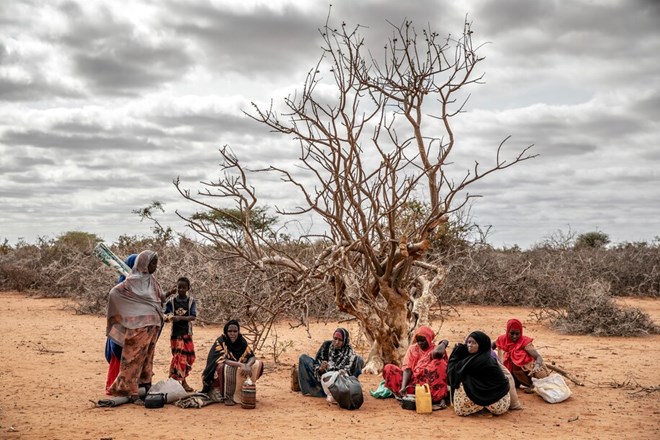
By Karina Tsui
Saturday September 17, 2022

A group of women displaced by drought rest under a tree as they walk to a camp in a southern region of Somalia in June. (Luis Tato/FTWP)
The number of people experiencing extreme hunger has more
than doubled in some of the countries most vulnerable to climate change, the
charity group Oxfam International said in a new report.
Some 48 million people are now suffering from acute hunger,
the group said, up from 21 million in 2016. Nearly 18 million of those people —
in countries such as Afghanistan, Haiti, Somalia and Zimbabwe — are on the
brink of starvation, their lives already disrupted by war, displacement,
economic insecurity and the coronavirus pandemic.
Conflict remains the primary driver of hunger, but “the
onslaught of climate disasters is now outpacing poor people’s ability to cope,
pushing them deeper into severe hunger,” Gabriela Bucher, executive director of
Oxfam International, said in a statement.
The report found a strong correlation between extreme
weather and rising hunger in 10 climate hot spots, which are Afghanistan,
Burkina Faso, Djibouti, Guatemala, Haiti, Kenya, Madagascar, Niger, Somalia and
Zimbabwe. The countries were identified as hot spots because they had the
highest number of United Nations humanitarian appeals for weather-related
crises since 2000.
While it is difficult to measure the exact direct impact of
climate change on hunger, the report said, as extreme weather “becomes more
fierce and more frequent,” it is devastating the lives of millions of people,
destroying homes and crops.
The majority of the countries listed are in Africa, where
the worst drought in nearly half a century has ravaged communities and caused
food shortages, worsened by the war in Ukraine.
Four of the 10 countries — Kenya, Madagascar, Somalia and
Zimbabwe — have consistently suffered from food insecurity, “primarily due to
weather-related disasters,” according to the World Food Program’s Global Report
for Food Crises.
Oxfam International says Somalia is facing its worst drought
on record — and that famine is “expected to unfold” in at least two districts.
One million people have been forced to flee their homes as a result, the report
said.
“Climate change is no
longer a ticking bomb, it is exploding before our eyes,” Bucher said.
The report notes that countries “least responsible” for the
climate crisis are suffering the most from its impact. Together, the most
vulnerable nations account for just 0.13 percent of global carbon emissions but
“sit in the bottom third of countries least ready for climate change,” the
report says.
In contrast, industrialized nations, including members of
the Group of 20, are responsible for nearly 80 percent of global emissions.
“We cannot fix the climate crisis without fixing the
systemic inequalities in our food and energy systems,” Bucher said. “... Rich
and most polluting nations have a moral responsibility to compensate low-income
countries most impacted by the climate crisis. This is an ethical obligation,
not charity.”